#or north korean
Text
i know it's memed a lot and outside of that a lot more eloquent people than i have discussed it, but it really is fucked up how so many things are seen as inherently bad when it's chinese
#or north korean#or any socialist or communist country really but china and nk get hit with it hardest in the us ive noticed#like i think about so many things that happen here in the us that if they happened in china or nk that#americans would be disgusted by but don't think twice about when they happened here#mickey.txt#sinophobia cw#like any movie about the american military tbh#i literally saw one where an american solider sniped down a local small boy who was holding a molotov cocktail#EVEN THOUGH THE AMERICANS WERE INVADING but its okay because he was sad after ): LIKE??#or on a less heavy sense#that time when my mom and i drove passed a farm that was hanging a huge american flag on the side of the barn#or when it was really early in the morning and the news needed filler#so they played stock footage of pretty scenery while a little girl sang a song about america#or how often times. not matter how small the event is. kids sports games will often play the national anthem at the beginning#or even when cartoon network or 4kids would have channel blocks around 4th of july#or presidents day#and would super impose pokemon with historical figures and presidents#or would edit cartoon clips so cartoon characters would sing the national anthem#and ofc us forcing kids to say the pledge of allegiance (which is a heavy phrase when you break it down)#im rambling but seriously this country does so much nationalistic bullshit and we think its perfectly fine#but if and when any asian/swena country does anything like it we have days of news stories#discussing how brainwashed those citizens are#i feel like that fucking charlie day meme when i explain it to people esp my parents but its really obvious when you step back and look#its maddening
6 notes
·
View notes
Text
the dprk is one of the many countries in the west where you are actively and constantly pushed to be openly racist towards 24/7, 365
4K notes
·
View notes
Text
You simply cannot take a stance against Imperialism whilst simultaneously believing in, and upholding, propaganda against North Korea. It is you responsibility and duty to unlearn what you’ve been told about North Korea.
#north korea has never been the enemy#north korea#anti capitalism#anti imperialism#communism#socialism#korean war#korean history#free palestine
1K notes
·
View notes
Text
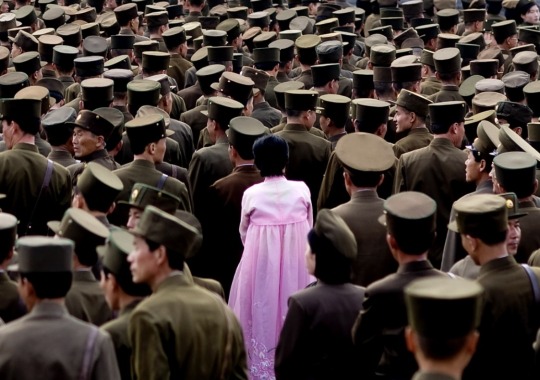
A woman searches for her lover in a crowd of soliders in Pyongyang, North Korea (2008) Photog. Eric Lafforgue
#pyongyang#north korea#photography#pink#lovecore#love#hopeless romantic#romance#romantic#korea#korean
809 notes
·
View notes
Text
general dprk discourse is genuinely insane when you've stepped out of the whole western brain rot that views the country as fucking mordor. its genuinely depressing too because the dprk's history isn't hard to learn or understand, i learned about how millions of civilians were bombed and killed in my conservative history class age 15
but its still so easy to find videos or tiktoks with millions of views saying how the dprk has this scheme to lure people into the country for vaguely nefarious means, or whatever insane diatribe yeonmi park went on in a conservative podcast - that's not just cycled round by people who are just not political, but leftists who are fully educated in all of this but still refuse to re-evaluate their understanding of a foreign country
its such a terrifying and annoying testament to capitalist brainwashing that a lot of conceptions of north korea that can easily be explained by logical facts of its readily available history (sanctions, after effects of the korean war, foreign relations) are ignored for instead the most fantastical explanation like kim jong un's the grinch or something
#it just bugs me. so so much. had to rant about it#catalyst was a tiktok 'debunking north korean propaganda accounts'#u are fuckin delusion if u think the dprk's government is advertising to kids on TIKTOK#my post
650 notes
·
View notes
Photo
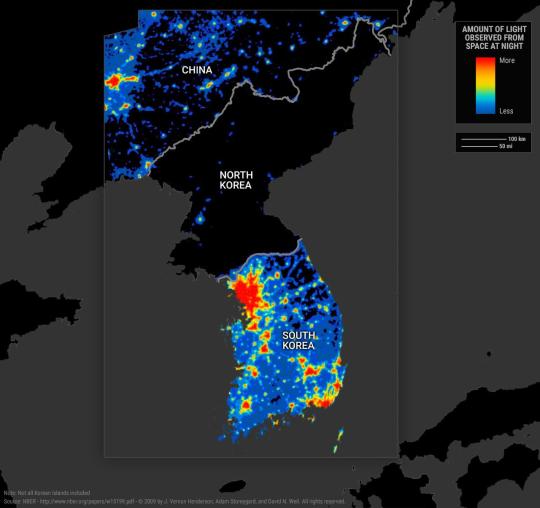
The illumination of the Korean Peninsula at night
250 notes
·
View notes
Text

a 1967 North Korean stamp from a series on domestic animals
[ID: a postage stamp with an illustration of a domestic pig. the illustration uses a limited color palette, mainly light yellow, grey, and white. the pig has dark fur with white points on its snout, feet, and the tip of its tail. it appears to be a sow. the face value of this stamp is 5 North Korean jeon. end ID]
#snail mail#stamps#postal#postage#animals#pigs#north korea#request fill#EDIT: the image description previously#incorrectly stated that this stamp was worth “5 North Korean chon”. this has been corrected to “5 North Korean jeon”.
120 notes
·
View notes
Text
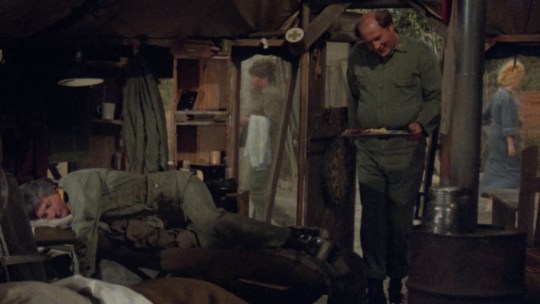
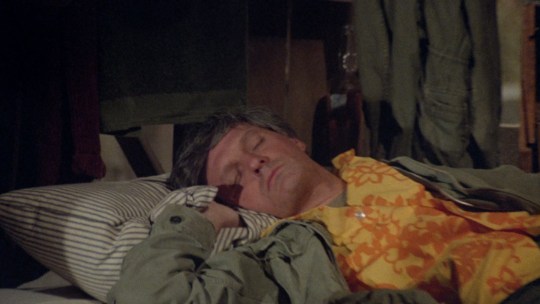
started rewatching s9, feeling a lot of emotions about Hawkeye in the best of enemies
#my eyes watered when Hawk joined the North Korean soldier in digging the grave. but I'm a crybaby these days/weeks#poor babygirl#hawkeye pierce#m*a*s*h
80 notes
·
View notes
Text

F-86 sabre-first-swept-wing-fighter-1950
@violetpilot1 via X
67 notes
·
View notes
Text
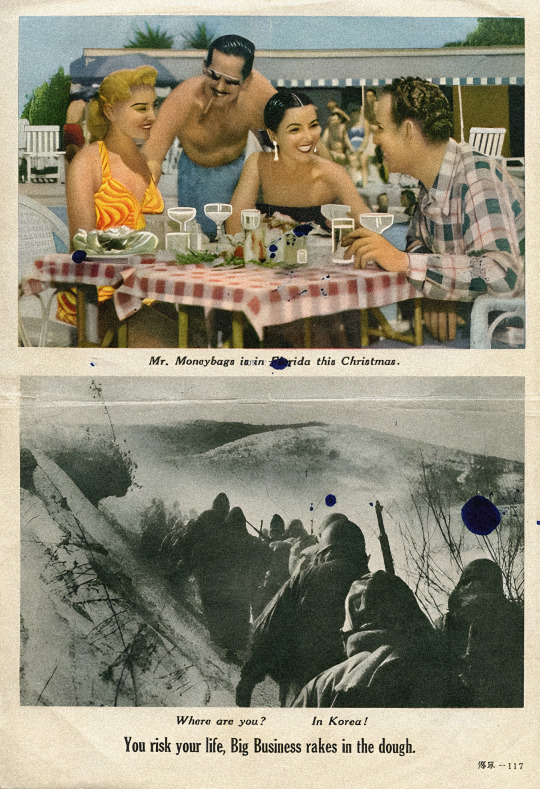
"You risk your life, Big Business rakes in the dough."
Democratic People's Republic of Korea
c. 1950s
#propaganda#poster#vintage#imperialism#capitalism#communism#socialism#north korea#korea#dprk#united states#korean war#big business#anti capitalism
107 notes
·
View notes
Text
does anyone have reading recommendations that clarify the difference between liberalism and fascism? I’m having trouble distinguishing what is just like normal levels of imperial/colonial violence conducted by a liberal state and what pushes it over the edge into a fascist state. Is fascism simply mature liberalism? Is it liberalism in crisis? Can we only make historical, reactive judgements about what is fascist, which is to say, can we only know if fascism occurred after it has come and gone? I take the general point that calling all liberal states fascist can let them off the hook for types of violence considered normal or “just doing business,” invisibilising the daily violences they conduct as part of the regular maintenance of a liberal capitalist state. People are calling the US fascist for its direct participation in and funding of the genocide in Palestine - a diagnosis I don't disagree with, but if that’s the case, where do you draw the distinction between the US being merely a liberal state with aggressive global imperial ambitions and the US being a fully fascist state? Perhaps more bluntly, what’s the difference between a liberal drone strike and a fascist one? I’m struggling to understand the value of the fascist label, because everything it describes (ultranationalism, a theory of racial and cultural degeneracy/decline, paranoia about an imminent external threat expressed as violence against internal populations deemed to have insufficient loyalty to the country, a turn towards a mythologised tradition of the past, imperial expansion, genocidal projects against minority populations, etc etc) just seems to me like a description of United States in general lol
#if we call all liberal states fascist we risk exceptionalising liberalism <- point I am sympathetic to#but if that’s the case then like what does the fascist label get us? What does it ‘do’ as analytical tool? How does it help us understand#the world today and the history of the world?#was the iraq war fascist? If so are we meant to understand that the US stopped being fascist for a couple years#and is now fascist again? Despite the continued occupation & violence & sanctions in Iraq Libya Yemen Afghanistan etc during that time ?#are all the coups it did in Latin America fascist or just normal liberal behaviour? Was the Korean War fascist? The Vietnam war?#what about the Cold War? What about the genocide of indigenous people in North America? What about chattel slavery?#I guess I’m just at like a point in my knowledge of history that none of the governments or movements or actuons called fascist#seem even remotely different from just like regular imperial and colonial violence#and so like my current inclination is that either all of this is liberal or all of this is fascist#and that doesn’t feel satisfactory lol
87 notes
·
View notes
Text
The thing is, the Western superpowers NEED the people divided. Division leads war, displacement, economic collapse, forced assimilation— repercussions that generate income for the overarching hegemony. Division is their backbone. This is why any act of unity in history has been retroactively distorted to brainwash us into thinking there is no alternative to Capitalism. The United States attempted to physically divide Vietnam in the US attempted- intervention on Vietnam, and successfully divided Korea shortly after the nation’s liberation from brutal Japanese occupation.
You can read about the ongoing Korean War here, and see a timeline here.
North Korea has been systematically demonised for being one of the few successful modern Socialist states; for the crime of liberation. They are a demonstration of what anti-Capitalism looks like, and yet we are barred from witnessing that with our own eyes. The Western propaganda machine works at maximum capacity to ensure the masses are deluded into believing North Korea is an evil, oppressive regime, a corrupt government that abuses and oppresses its people— whilst homelessness is at an all time high in the United States and Western nations, with an extortionate cost of living, inaccessible health care and rampant medical negligence, Not to mention, police brutality, Neo-Nazism (like, Western-funded Ukraine’s historic complicity with Nazism) anti-Trans laws that lead to murders of Trans people, and the Western Israeli Regime’s support in multiple genocides across the globe (Mayan, Tamil, Rwanda and of course, Palestine). Not to mention, North Korea has had unwavering support for Palestine
The West has been lying to us for years about China, North Korea, Cuba, Vietnam, Palestine, Iran and so many more nations to mask their deadly Imperial ambitions, money-hungry forceful acquisition of oil and resources, and further imposition of globalised White Supremacy. We, the people, suffer at the hands of our very nations that copiously delude us into thinking there’s no way out, there’s no alternative, there’s no hope.
We implore you learn more about North Korea, and will be adding more resources to our Drive, linked in our link tree. Here’s some more resources on Korea:
Nodutdol 노둣돌 is an excellent pro-Palestinian organisation of diasporic Koreans organising for a world free of Imperialism, and for the reunification of Korea. Check out their page, and website, to keep up to date on their events, organising and get more information on what the West try to hide.
We also recommend this excellent documentary:
youtube
#korea#north korea#western propaganda#anti imperialism#anti capitalism#anti west#free palestine#palestine#jumblr#israel#resources#north korea has never been the enemy#korean unification now#Youtube#dprk
321 notes
·
View notes
Text
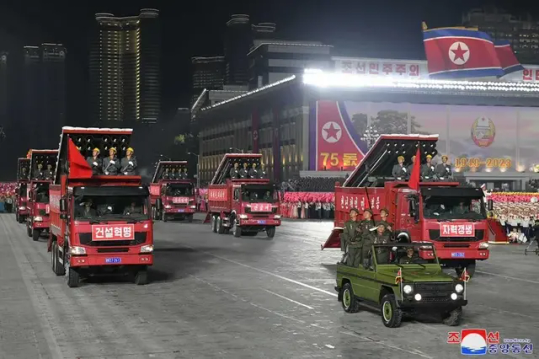
North Korean Worker-Peasant Red Guards rocket launchers disguised as dump trucks, 75th Anniversary Parade in Pyongyang, September 2023
131 notes
·
View notes
Text
Seeing characters in romance stories just jetting between countries at a moment's notice with no thought for visa; seeing airports as sites of triumphant climaxes and romantic denouements instead of places of fear and danger where a sword hangs above your head— it all breaks off little pieces of my heart. They're constant reminders that my people will never be human enough in the colonial world order to be allowed to move freely around it. No matter what your race, those non-refugees living in the Global North will never understand what it's like to be part of a global ghetto where your passport is nothing but a trembling supplication and humiliation.
#race#racism#westerners will never know the dehumanization of the visa office#the ability to afford a plane ticket and the ability to get your visa stamped goes hand in hand#bc you're not allowed to leave the country unless you can show that you can afford to stay there and come back#you have to swear in blood that you won't overstay a minute longer than you're permitted to and sign your firstborn as collateral#a western airport is the closest i can come to the muslim experience bc the authorities will only care about my skin tone#that season 2 finale of Sense8 where the Mexican‚ and Kenyan and Indian characters of the cluster were able to flee to the US within hours#at the same time as the south korean and westerners#had Lankan fans falling down laughing#we're willing to suspend our disbelief of the science fiction telepathy shenanigans but THAT is a bridge too far#sadly not even the worst of the Wakowskis racefails#I love that show but its Caucasity was aggressive#global south#global north#immigration#refugees#islamophobia#no fly list#white supremacy#coloniality#western imperialism#colonial capitalism#knee of huss
65 notes
·
View notes
Text

oomfies i finally made a meet the artist
#meet the artist#lesbian#transmasculine#trans#my art#transmasc#butch#korean#buryat#north asian artists#lgbt#artists on tumblr
99 notes
·
View notes
Text
I will be curious to read the vituperative denials of the validity of this article's analysis, which is pasted below the cutoff:
“Are you better off today than you were four years ago?” That question, first posed by Ronald Reagan in a 1980 presidential-campaign debate with Jimmy Carter, has become the quintessential political question about the economy. And most Americans today, it seems, would say their answer is no. In a new survey by Bankrate published on Wednesday, only 21 percent of those surveyed said their financial situation had improved since Joe Biden was elected president in 2020, against 50 percent who said it had gotten worse. That echoed the results of an ABC News/Washington Post poll from September, in which 44 percent of those surveyed said they were worse off financially since Biden’s election. And in a New York Times/Siena College poll released last week, 53 percent of registered voters said that Biden’s policies had hurt them personally.
As has been much commented on (including by me), this gloom is striking when contrasted with the actual performance of the U.S. economy, which grew at an annual rate of 4.9 percent in the most recent quarter, and which has seen unemployment holding below 4 percent for more than 18 months. But the downbeat mood is perhaps even more striking when contrasted with the picture offered by the Federal Reserve’s recently released Survey of Consumer
The survey provides an in-depth analysis of the financial condition of American households, conducted for the Fed by the National Opinion Research Center at the University of Chicago. Published every three years, it’s the proverbial gold standard of household research. The latest survey looked at Americans’ net worth as of mid-to-late 2022 and Americans’ income in 2021, comparing them with equivalent data from three years earlier. It found that despite the severe disruption to the economy caused by the pandemic and the recovery from it, Americans across the spectrum saw their incomes and wealth rise over the survey period.
The rise in median household net worth was the most notable improvement: It jumped by 37 percent from 2019 to 2022, rising to $192,000. (All numbers are adjusted for inflation.) Americans in every income bracket saw substantial gains, with the biggest gains registered by people in the middle and upper-middle brackets, which suggests that a slight narrowing of wealth inequality occurred during this time. In particular, Black and Latino households saw their median net worth rise faster than white households did—though the racial wealth gap is so wide that it narrowed only slightly as a result of this change.
A big driver of this increase was the rising value of people’s homes—and a higher percentage of Americans owned homes in 2022 than did in 2019. But households’ financial position improved in other ways too. The amount of money that the median household had in bank accounts and retirement accounts rose substantially. The percentage of Americans owning stocks directly (that is, not in retirement accounts) jumped by more than a third, from about 15 to 21 percent. The percentage of Americans with retirement accounts went from 50.5 to 54.3 percent, a notable improvement. And a fifth of Americans reported owning a business, the highest proportion since the survey began in its current form (in 1989).
Americans also reduced their debt loads during the pandemic. The median credit-card balance dropped by 14 percent, and the share of people with car loans fell. More significantly still, Americans’ median debt-to-asset, debt-to-income, and debt-payment-to-income ratios all fell, meaning that U.S. households had lower debt burdens, on average, in 2022 than they’d had three years earlier.
The gains in real income (in this case, measured from 2018 to 2021) were small—median household income rose 3 percent, with every income bracket seeing gains. But that was better than one might have expected, given that this period included a pandemic-induced recession and only a single year of recovery.
The picture the survey paints, then, is one of American households not only weathering the pandemic in surprisingly good shape, but ultimately also emerging from it in better financial shape than they were going in. And that, in turn, points to the effect of the U.S. policy response to the crisis: Stimulus payments, enhanced unemployment benefits, the child-care tax credit, and the moratorium on student-loan payments boosted household income and balance sheets, helping people pay down debt and increase their savings. In the process, these policies mildly narrowed inequality.
The U.S. government’s aggressive response to the pandemic, including Biden’s stimulus spending, also helped the job market recover all its pandemic-related losses—and add millions of jobs on top. The resulting tight labor market has been a huge boon to lower-wage workers. In fact, because the Fed survey’s income data end in 2021, it understates the income gains for the bottom half of the workforce, and the shrinking income inequality they’ve produced.
Hourly wages for production and nonsupervisory workers (who make up about 80 percent of the American workforce) rose 4.4 percent year-on-year in the third quarter of 2023, for instance, ahead of the pace of inflation. And this was not anomalous: Arindrajit Dube, an economist at the University of Massachusetts at Amherst, crunched the numbers and found that real wages for that same sector of workers are not just higher than they were in 2019, but are now roughly where they would have been if we’d continued on the upward pre-pandemic trend.
The reason for this is simple: Low unemployment has translated into higher wages. As a recent working paper by Dube, David Autor, and Annie McGrew shows, the tight labor markets of the past few years have given lower-wage workers more bargaining power than in the past, leading to a compression in the wage gap between higher-paid and lower-paid workers. Of course, that gap is still immense, but the three scholars found that the wage gains for lower-paid workers have rolled back about a quarter of the rise in inequality that has occurred since the 1980s.
So what should we take away from the Survey of Consumer Finances data, and from Dube, Autor, and McGrew’s work? Not that everything is fine, but that public policy and macroeconomic management matter a lot. Enhanced unemployment benefits, the child-care tax credit, the stimulus payments—these things materially improved the lives of Americans and helped set the economy up for a strong recovery. If the policy response had been less aggressive, the U.S. economy would be in worse shape now. This is something you can see by looking at Europe, where economies are growing far more slowly and unemployment is higher, while inflation is no lower.
Key to this story is the fact that lower-wage workers in particular would be worse off, because they have been among the chief beneficiaries of the low unemployment created by the robust recovery. It’s a useful reminder that stagnant wages are not an inevitable result of American capitalism: When labor markets are tight, and employers have to compete with one another for employees, workers get paid more.
So, even allowing for the high inflation we saw in 2022, no one could really look at the U.S. economy today and say that the policy choices of the past three years made us poorer. Yet that, of course, is precisely how many Americans feel.
Although that pessimism does not bode well for Biden’s reelection prospects, the real problem with it is even more far-reaching: If voters think that policies that helped them actually hurt them, that makes it much less likely that politicians will embrace similar policies in the future. The U.S. got a lot right in its macroeconomic approach over the past three years. Too bad that voters think it got so much wrong.
#someone somewhere out there will find this infuriating#I'm not an economist and almost every time anyone says anything about economics I think 'sure that makes sense'#so I post in my ignorance#try to resist calling me a retard when you tear this apart#and it's always the worst with things like statistics because someone's gonna be like 'well if you reframe the numbers slightly#you'll find that in fact this article demonstrates that we have less wealth per capita than your average North Korean'
63 notes
·
View notes